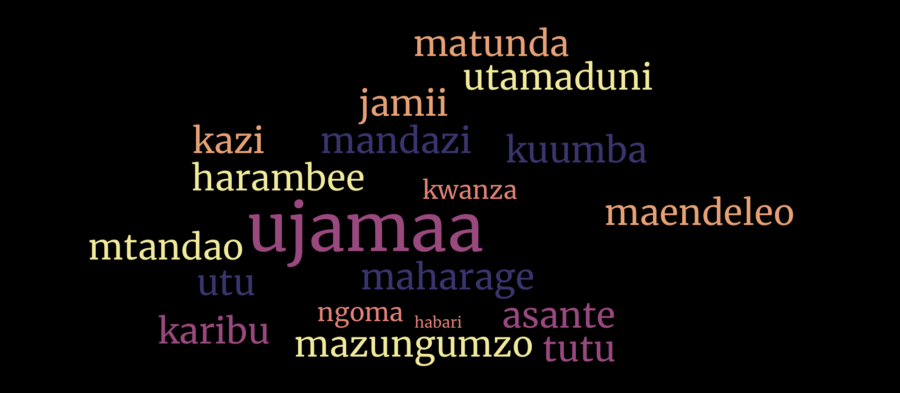
World Kiswahili Language Day – 07 July each year
Theme: Kiswahili: education and culture of peace
Main event: UNESCO Headquarters in Paris

In numbers
Numbers: one of the top 10 spoken languages in the world; spoken by 230 million people globally
10 most widely spoken languages in the world, with more than 230 million speakers.
Why this day according to UNESCO
According to UNESCO, celebrating this day helps with:
- Improved knowledge of the Kiswahili language as a vehicle for peace and strengthening multiculturalism
- Promotion of the values, ideas, thoughts, and philosophy of renowned advocates of the Kiswahili language
- Assessment of the availability of Kiswahili language resources and tools needed to promote a culture of peace.
- Raising awareness of the historical context/trajectory, current and future aspects of the Kiswahili language internationally
- Encouraging more research and socio-cultural activities to strengthen multiculturalism through the Kiswahili language; and
- Strengthening the interest and use of Kiswahili among young people through social media programmes, music and cultural activities with a focus on peace.
Ways to celebrate
There are many ways to celebrate this day, for example:
- Learn Kiswahili phrases: Dedicate time to learning basic Kiswahili phrases like Habari yako? (How are you?), Asante (Thank you), or Karibu (Welcome). Incorporate concepts such as tutu (cool), utu (humanity), and ujamaa (familyhood).
- Teach the philosophy this language comes from: The philosophy is Utu or Ubuntu which means value for the familyhood, communality, society, environment and spirituality and their connectedness.
- Host a Kiswahili language event: Organise an event where people can come together to learn about the Kiswahili language and culture. Include discussions on concepts like kuumba (creativity) and ujamii (community).
- Share Kiswahili literature: Read or share Kiswahili literature, poetry, or hadithi za jadi (folktales) with others. Discuss themes depicted in the works that reflect Kiswahili culture and values.
- Cook Kiswahili cuisine: Explore and prepare Kiswahili dishes such as maharage ya nazi (coconut beans) or mandazi (sweet fried dough). Food is a great way to connect with utamaduni na mila (culture and traditions).
- Attend cultural performances: Look for local events or performances that celebrate Kiswahili culture, such as ngoma (dance). Themes of harambee (pulling together) could be highlighted.
- Social media campaign: Start a social media campaign to raise awareness about the importance of the Kiswahili language and its global impact. Share facts, language tips, or personal stories related to Kiswahili using hashtags like #SwahiliCulture or #WorldKiswahiliDay.
- Visit Kiswahili-speaking communities: If possible, visit a community where Kiswahili is widely spoken. Engage with locals and immerse yourself in the language and utamaduni (culture).
- Organise language exchange: Arrange a language exchange session where native Kiswahili speakers can teach others the language, and vice versa. This could involve practicing mazungumzo (conversations) or learning about desturi na tamaduni (customs and traditions).
- Create educational materials: Develop or share educational materials about the Kiswahili language and culture, such as posters, vipeperushi (leaflets), or videos featuring interviews with native speakers.
- Support Kiswahili learning initiatives: Donate to or volunteer with organisations that promote Kiswahili language education and literacy. This helps sustain and expand the reach of Kiswahili as a global language.
Common words
- Habari – Greetings, news
- Asante – Thank you
- Karibu – Welcome
- Tutu – Cool
- Utu – Humanity, justice
- Ujamaa – Familyhood, communalism
- Kuumba – Creativity
- Ujamaa – Community
- Maharage – Beans
- Mandazi – Sweet fried dough
- Ngoma – Dance, drum
- Harambee – Pulling together, community effort
- Utamaduni – Culture
- Mazungumzo – Conversations, dialogue
- Mtandao – Network
- Maendeleo – Development
- Kazi zaJamii – Social work
- Matunda yaKwanza – First fruit
Counting numbers if Kiswahili
- Moja – One
- Mbili – Two
- Tatu – Three
- Nne – Four
- Tano – Five
- Sita – Six
- Saba – Seven
- Nane – Eight
- Tisa – Nine
- Kumi – Ten
- Kumi na moja – Eleven
- Kumi na mbili – Twelve
- Kumi na tatu – Thirteen
- Kumi na nne – Fourteen
- Kumi na tano – Fifteen
- Kumi na sita – Sixteen
- Kumi na saba – Seventeen
- Kumi na nane – Eighteen
- Kumi na tisa – Nineteen
- Ishirini – Twenty
Celebrating World Kiswahili Day is an opportunity to appreciate the richness of the language and its philosophical and cultural heritage, while promoting its use and appreciation globally. Incorporating Swahili concepts and words adds depth to the celebration, connecting people with the diverse cultural aspects encapsulated within Kiswahili.
Use the form below to subscibe to Owia Bulletin.
Discover more from Africa Social Work & Development Network | Mtandao waKazi zaJamii naMaendeleo waAfrika
Subscribe to get the latest posts sent to your email.




You must be logged in to post a comment.